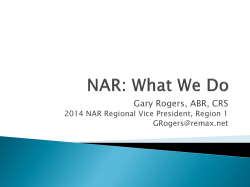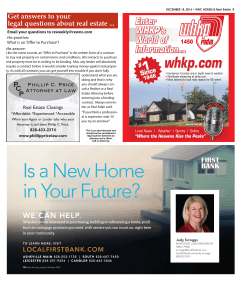
2015 Brochure - International Housing Finance Program
program objectives COST OF THE PROGRAM The need for objective and analytial education in housing finance has never been more acute. Many countries are assessing their housing finance systems in the wake of the recent crisis, and both policymakers and private practitioners need cutting-edge information on new developments in lending procedures, funding models, regulations, and government support for the sector. “Housing Finance in a Changing Global Environment”, June 1 - 11, 2015. Program Fees $5,500* Early Bird Rate $5,000** In the 30-year history of the program, the course has provided participants with the latest knowledge in housing finance - always adjusting to the changing international context. It has remained focused on its two core objectives: enhancing the professional ability of the participants; and improving the short- and long-term effectiveness of their sponsoring organizations. Participants come from private housing finance institutions, government housing and finance agencies, and academic and international development institutions from both emerging market and advanced economies. program format and venue The program will be held in state-of-the-art facilities at the Wharton School, at the University of Pennsylvania. Each training module blends academic principles with practical, real-life applications. Lecturers are recognized leaders in the international housing and real estate fields, and have extensive experience in housing finance system development and transformation in both advanced and emerging market economies. Lecturers will follow a structured lesson plan, but will allow for open dialogue with participants at all times. Case studies will be used where appropriate, and small group discussions will complement classroom discourse. For all training modules, participants will receive digital copies of reading materials and hard copies of lecture notes. All lectures are in English. Simultaneous interpretation in a particular language may be provided if there is sufficient demand for such service. Workshop on Securitization, June 12 - 13, 2015. Program Fees $1,200* Program fees include training materials, refreshment breaks, and some special lunches and dinners. Participants are responsible for their own hotel accommodations and other meals. *Registration and payment must be received by Friday May 1, 2015. **Early Bird registration deadline is Friday March 27, 2015. METHODS OF PAYMENT Payment by Bank Transfer International Housing Finance Program 2015 Payment by Check Wells Fargo Bank N.A. 420 Montgomery Street San Francisco, CA 94101 Account # 2000018692644 ABA # 121-000-248 Swift Code: WFBUIS6S For Credit to: The Trustees of the University of Pennsylvania Reference: ORG 0816 Make check(s) payable to: The Trustees of the University of Pennsylvania Attn: Marja Hoek-Smit, Zell/Lurie Real Estate Center University of Pennsylvania 1462 Steinberg-Dietrich Hall 3620 Locust Walk Philadlephia, PA 19104-6302 USA organizing institutions The Wharton School International Housing Finance Program Initiated in 1986, IHFP is a comprehensive housing finance program with three complementary activities: educating senior officials and CEOs, academics and consultants, particularly from emerging market economies, in the financial, managerial, mathematical, institutional and policy aspects of housing finance; assisting emerging market economies in expanding education in housing finance; and offering consulting services in housing finance and housing policy development. The program has educated more than 3,000 individuals from more than 80 countries. Not sponsored by any special interest group, the program provides the most objective, comparative and analytical education in the field of interantional housing finance. The Wharton School, University of Pennsylvania Since its founding in 1881 as the world’s first business school, the Wharton School has been a leader in the field of business education and research in the global economy. The Wharton Real Estate Department follows this tradition through its international real estate education and research, covering all areas of importance to real estate including housing finance, commercial real estate finance, and housing and urban policy. The department is consistently ranked as the nation’s best real estate program by US News and World Report. participantS’ EVALUATION “The International Housing Finance Program of Wharton is a very extensive and in-depth course about housing finance in emerging markets. It will give you the tools you need in your everyday job and to assist in strategic policy decisions that need to be made in your organization. The teachers are very committed and knowledgeable with a hands-on approach.” Registration Deadline is accomodations Participants are responsible for securing hotel accommodations. Due to other events at the same time as our program, many hotels may fill up. We encourage participants to make arrangements as early as possible. Rooms are available at a reduced rate in the Club Quarters Hotel in Center City Philadelphia. It is a 25-minute walk from the Wharton School, and connected to the campus by public transportation. If you choose to stay at other hotels, here are some alternatives located on the University of Pennsylvania campus: The Club Quarters Hotel 1628 Chestnut Street Philadelphia PA 19103 (203) 905-2100 Group code: UPE531 www.clubquarters.com The Sheraton Hotel 3549 Chestnut Street Philadelphia PA 19104 (215) 387-8000 www.philadelphiasheton. com The Inn at Penn (Hilton) 3600 Sansom Street Philadelphia PA 19104 (215) 222-0200 www.theinnatpenn.com For additional Information “The course provides and opportunity to meet people from across the world and exchange views on housing finance systems in their respective countries. The teachers are exceptionally well-informed and it is a pleasure to attend the program.” To download an application form: www.ihfp.wharton.upenn.edu “I’m so glad I had the opportunity to participate in the IHFP program. Housing finance systems are critical and urgent for my country (China) and the top priority now is learning as much as we can from other countries, especially good experiences in emerging markets.” Email: housingfinance@wharton.upenn.edu “I found the workshop extremely fruitful. It has gone a long way to widen my horizon, skill and competency as a mortgage banker (in Nigeria). I whole-heartedly recommend the course for every professional mortgage banker from emerging markets because it is capable of impacting our housing policies positively.” FRIDAY MAY 1, 2015 Telephone: 215-898-3313 or 215-898-2841 Facsimilie: 215-573-2220 Drs. Marja Hoek-Smit, Director International Housing Finance Program Samuel Zell/Robert Lurie Real Estate Center The Wharton School University of Pennsylvania 1462 Steinberg Hall-Dietrich Hall 3620 Locust Walk Philadelphia, Pennsylvania 19104-6304 Samuel Zell and Robert Lurie Real Estate Center The Wharton School, University of Pennsylvania Philadelphia, PA Housing Finance in a Changing Global Environment Monday June 1 - Thursday June 11, 2015 Workshop on Securitization Friday June 12 - Saturday June 13, 2015 INTERNATIONAL HOUSING FINANCE PROGRAM 2015 - HOUSING FINANCE IN A CHANGING GLOBAL ENVIRONMENT INTRODUCTION Registration and Welcome MODULE I HOUSING MARKETS, HOUSING POLICY & HOUSING FINANCE This module introduces the context in which housing finance systems operate. It explains the relationship between housing and the macro-economy, the working of housing markets and the critical role of policy in the expansion of formal housing markets. Global Trends in Housing Finance Dr. Michael Lea, San Diego State University Housing, the Economy, and the Supply Chain Drs. Marja Hoek-Smit,Wharton School Determinants of demand and supply of housing The workings of the housing market Policies and regulations to expand housing (finance) markets Module II Developing Housing finance Systems module v Module IX PRIMARY MORTGAGE MARKET INNOVATIONS shari’ah compliant housing finance This module discusses legal alternatives and state-of-the-art retail delivery and administrative systems for mortgages lending. This module explains Shari’ah compliant financial contracts and home finance instruments, and funding mechanisms. International Case Studies Case Studies: Denmark module vI development and construction finance This module discusses different modes of construction or bridge finance and real estate investment vehicles. Mr. Fred Cooper, Drs. Marja Hoek-Smit, Ms. Soula Proxenos This module sets the framework for the remainder of the course by focusing on housing finance systems development in different regions of the world and explaining the relationship between housing finance systems and financial sector development. Developing Housing Finance Systems Dr. Michael Lea Effective and ineffective housing finance systems Requirements for effective housing systems Borrowing models from other countries Types of Housing Finance Systems/Strengths and Weaknesses Dr. Michael Lea, Drs. Marja Hoek-Smit Portfolio lenders Temporary lenders plus secondary markets Government housing banks module Iii the business of housing finance This module explores principles and innovations in managing the profitability and risks of housing finance institutions. Profitability and Risk of Housing Finance Institutions Dr. Haluk ünal, University of Maryland The balance sheet as the driver of profitability Credit risk and methods to deal with it Liquidity risk Interest rate risk and risk management methods Value at risk Module IV Legal and Underwriting Systems for Housing Finance Mr. Ken Dorph, Sag Harbor Consulting Shari’ah Compliant Housing Finance Products in Primary Market Shari’ah Compliant Securitization - Sukuk module x ExPANDING MORTGAGE FINANCE & housing services to lower income groups This module integrates lessons from the previous topics and applies these methods to extend housing finance to underserved markets, including mortgage, non-collateralized and microfinance lending, and financing rental housing. We also analyze different ways to subsidize housing and housing finance. Equity, Debt, Real Side, Financial Risks and Pricing Limits of Mortgage FinanceExpanding in Reaching Down-Market Drs. Marja Hoek-Smit Market and policy failures Incomplete credit markets: lending risks & how to alleviate them, incomes & costs Equity Investments in Affordable Housing Dealing with Credit Risk: Mortgage Insurance Mr. Roger Blood, Oliver Wyman Visit to Housing Development Dealing with Credit Risk: Consumer Education Micro-Mortgages, Micro-Loans for Housing, Savings for Housing Rental Housing Finance Drs. Marja Hoek-Smit module viI types of funding models This module explains alternative funding models--deposit-based, refinancing, mortgage bond, secondary mortgage market models and the risks and constraints each addresses, and conditions and requirements for their development. Dr. Michael Lea, Dr.Todd Sinai Mortgage Funding Basics Alternative Capital Market Funding Models Liquidity facilities Mortgage bond funding Securitization Valuing Mortgage Instruments and Their Risks Mortgage-banked securities as investment instruments Subsidizing Housing Finance Drs. Marja Hoek-Smit Rationales for housing subsidies Changing subsidies for housing finance systems Various types of subsidy arrangements for households International Case Studies conclusion Certificate Ceremony Farewell Dinner Case Presentation: World Bank/IFC Module VIII Safety and soundness of financial institutions This module analyzes various ways government and the private sector can regulate the safety and soundness of the housing finance industry in the context of current regulatory reforms. Second, it addresses disclosure and consumer protection requirements. Housing Cycles and Bubbles Drs. Marja Hoek-Smit Mortgage Instruments This module teaches underlying legal concepts of the mortgage instrument, mortgage alternatives, and innovations in mortgage design. It discusses principles of pricing, hedging, and underwriting in the primary mortgage market. Dr. Michael Lea, Carol Rabenhorst J.D Mortgage Finance and Land Tenure Lawyer The Mortgage Instrument: Structure and Design The legal structure of the mortgage instrument Testing mortgage designs for robustness Mortgage design and amortization schedules Retail Functions Dr. Michael Lea, San Diego State University Comparing different modes of loan origination Loan underwriting: concepts, innovations, credit bureaus, credit scoring Loan servicing and delinquency management Loan pricing The Safety Net in Theory and Practice Dr. Richard Herring,Wharton School Real estate cycles and stress tests Controlling risks by government supervision and regulation Different regulatory practices Risk-based capital requirements Government versus market-based regulatory methods Market disclosure Building blocks of the new global regulatory system From Basel II to Basel III Consumer Protection WORKSHOP SECURITIZATION AND MORTGAGE BONDS The workshop covers mortgage-backed securities and collateralized mortgage obligations. Topics covered include structures and pricing, disclosures, and regulation. Legal Issues and Case Studies Related to Securitization Mr. David Barbour, Andrews Kurth LLP Fundamentals for Securitization Mr. Reggie de Villiers and Mr. Julian Broide, Bank of America-Merrill Lynch Financial Aspects of Mortgage Bonds Dr. Ralph Daloisio, Natixis The Role of Rating Agencies: An International Perspective Ms. Kruti Muni, Moody’s Investors Service
© Copyright 2025









